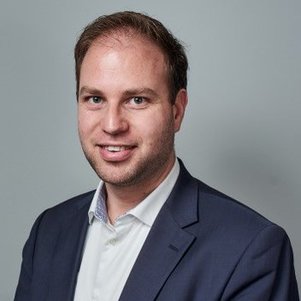Transdisciplinary collaboration for responsible innovation
Steven Flipse joined the Communication Design for Innovation (CDI) group in 2013. After his studies in engineering in the Life Sciences, he moved towards the social sciences to study how scientists and engineers collaborate and learn. He obtained his PhD in 2013 on responsible innovation through transdisciplinary collaborations between scholars from the natural and social sciences. He is associate editor for the Journal of Responsible Innovation.
Teaching
His teaching revolves around innovation development in complex social systems. He teaches a course on Wicked Innovation in the Master track CDI, and a course on Communication, Marketing and Innovation in CDI’s Minor program. He is also a member of the board of studies of the program.
Research
The primary research question that Steven aims to address is: how can scientists and engineers functionally collaborate with and learn from other actors, while simultaneously embracing responsible innovation principles? His research has three starting points:
-
Responsible innovation is not an easy concept to implement in science and engineering practice. From a wider European policy perspective, responsible innovation asks researchers to (1) anticipate the possible outcomes of their research, (2) include the viewpoints of a wide range of academic and non-academic stakeholders, (3) reflect on the socio-ethical and socio-economic context in which they work, and (4) actively take insights based on these three actions into consideration in their current and future innovation activities. Steven aims to study how decisions in innovation development can be broadened to include also considerations from other fields of expertise, including societal, policy-relevant, economic and environmental aspects.
-
As a social scientist he is working closely with natural scientists, designers and engineers in both industry and academia, to study how decisions are made in collaborations and how these can be inspired to include also viewpoints from other fields. In other words: how transdisciplinary collaboration and learning takes shape. The starting point for this, is a firm belief in the idea that including wider experience and expertise, also from outside the natural scientific and academic field, can positively contribute to innovation development. However, this possible positive is not taken for granted, but another object of study.
-
Steven explores the practical use and opportunities, sense and nonsense of transdisciplinarity and responsible innovation concepts in relation to on-going innovation work. Coming from a background in Life Sciences and Health, he remains predominantly interested in innovation in this field.
Papers on (inclusiveness and) responsible innovation
- Roosenboom-Kwee, Z., Yaghmaei, E. & Flipse, S. M. (2021) Responsible research and innovation in practice: an exploratory assessment of Key Performance Indicators (KPIs) in a Nanomedicine Project. Journal of Responsible Technology. 5, 100008, 1-13.
- Fraaije, A, & Flipse S.M. (2020) Synthesizing an implementation framework for responsible research and innovation, Journal of Responsible Innovation, 7:1, 113-137,
- Van de Poel, I.R., Asveld, L., Flipse, S.M.; Klaassen, P, Kwee, Z., Maia, M., Mantovani, E., Nathan, C., Porcari, A. & Yaghmaei, E. (2020) Learning to do responsible innovation in industry: six lessons, Journal of Responsible Innovation, 7:3, 697-707.
- E Yaghmaei, A Porcari, E Mantovani, SM Flipse (2019) Monitoring the value of responsible research and innovation in industrial nanotechnology innovation projects; Nanotechnology: Regulation and public discourse.
- Steven M. Flipse & Chris J. van de Loo (2018) Responsible innovation during front-end development: increasing intervention capacities for enhancing project management reflections on complexity, Journal of Responsible Innovation, 5:2, 225-240.
- Van de Poel, I.R., Asveld, L., Flipse, S.M., Klaassen, P., Scholten, V., Yaghmaei, E. (2017) Company Strategies for Responsible Research and Innovation (RRI): A Conceptual Model. Sustainability , 9, 2045.
- S.M. Flipse, K.H. Van Dam, J. Stragier, T.J.C. Oude Vrielink, M.C.A. Van der Sanden (2015) Operationalizing responsible research & innovation in industry through decision support in innovation practice. Journal on Chain and Network Science: 15 (2), 135 – 146.
Papers on transdisciplinary collaboration and learning
- Flipse, S.M., Puylaert, S. (2018) Organizing a Collaborative Development of Technological Design Requirements Using a Constructive Dialogue on Value Profiles: A Case in Automated Vehicle Development. Sci Eng Ethics 24, 49–72.
- Turşucu, S., Spandaw, J., Flipse, S., Jongbloed, G. & De Vries, M.J. (2018) Teachers’ beliefs systems about improving transfer of algebraic skills from mathematics into physics in senior pre-university education, International Journal of Science Education, 40:12, 1493-1519.
- Flipse, S.M., Van der Sanden, M.C.A., Radstake, M., De Winde, JJ., Osseweijer, P. (2014) The DNA of socially responsible innovation: Social and natural scientists need to establish mutual understanding and a common language to efficiently work together. EMBO Reports 15 134-137.
- Flipse, S.M., van der Sanden, M.C.A. & Osseweijer, P. (2014) Setting Up Spaces for Collaboration in Industry Between Researchers from the Natural and Social Sciences. Sci Eng Ethics 20, 7–22 (2014).
- Flipse, S.M., van der Sanden, M.C.A. & Osseweijer, P. (2013) The Why and How of Enabling the Integration of Social and Ethical Aspects in Research and Development. Sci Eng Ethics 19, 703–725.
- Flipse, S.M., van der Sanden, M.C.A. & Osseweijer, P. (2013) Midstream Modulation in Biotechnology Industry: Redefining What is ‘Part of the Job’ of Researchers in Industry. Sci Eng Ethics 19, 1141–1164.

dr.ir. Steven Flipse
Assistant Professor Science Communication
- +31 15 27 83054
- S.M.Flipse@tudelft.nl
-
Building 22, C 105
Lorentzweg 1
2628 CJ, Delft
